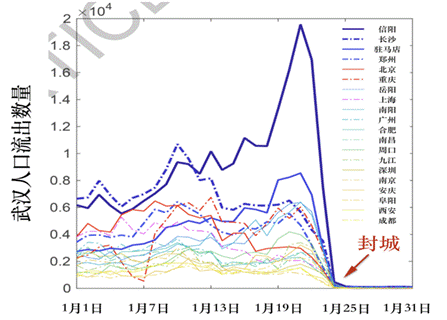Under the guidance of his supervisor, Yuan Yun, a postgraduate student of School of Economics and Management (SEM), cooperated and researched with several domestic and foreign professors, and jointly published the article “Population Flow Drives Spatio-Temporal Distribution of COVID-19 in China” online in the top international journal Nature on April 29, 2020 (London time).

The article builds a “population flow-risk source model”, which can utilize anonymous integrated data on population flow to accurately predict the spreading time and geographical distribution of COVID-19, and thus facilitates effective risk assessment and resource allocation for decision makers.

While developing the model, the researchers analyzed 11,478,484 people who flowed out of or through Wuhan from January 1 to January 24, 2020 based on displacement data on anonymous mobile phones. This population migrated to 31 provinces across the country, coving 296 prefecture-level cities. Their research indicates that the lockdown of Hubei Province is essentially correct. It can timely control the spread of infectious agents and effectively reduce the risk of epidemic in various places. Furthermore, the researchers find that according to the distribution of Wuhan’s outflow population on February 19, 2020, it is possible to accurately predict the relevant frequency and geographical distribution of people infected with COVID-19 across the country. In addition, a benchmark trend and an index of COVID-19 development derived from the “population flow-risk source model” can be used to assess the risk of coronavirus spread in different regions over time.
Unlike most epidemiological prediction models, the model built by their team predicts the geographical distribution and spreading trend of the epidemic based on the population’s actual movement. In terms of COVID-19, this model predicts national infection status and geographical distribution at least one week in advance. The team’s research outcome can provide early warning of the seriousness of the epidemic’s risk in different regions, and detect areas with severe community spreading. By this means, it provides relevant departments with some decision-making basis in the early stages of epidemic development so that they can take emergency measures in time. The authors of the article mention in the abstract that policy makers in any country can apply this method: to make rapid and accurate risk assessment through making use of existing population flow data, and plan for limited resource allocation before the epidemic outbreak.

One of the authors of this article, Nicholas A. Christakis, a professor at Yale University in the US, said, “The research outcome has revealed the accuracy of China’s case report on COVID-19. Totally different information from different sources (population flow based on mobile communication) can correctly predict the number of cases, which is in accordance with the epidemiological expectation (at least before February 19).”
After the article was released, there has been more than 30 news media coverage around the world including BBC. Many domestic media have reported it as well. Among them, China Global Television Network (CGTN), China Daily, China Science Daily, Global Times, The Shanghai Mercury, China News and other government media all emphasized the importance of this research for epidemic prevention and control. In addition to the academic contribution of the article itself, the research also demonstrates that China’s epidemic research is internationally cooperative, open and transparent: this article was submitted to the world’s authoritative academic journal Nature on February 18, 2020 and passed to relevant international institutions; it shared China’s experience in fighting the epidemic with the world without delay. Moreover, the article reveals that the epidemic data outside Wuhan in China is regular in time and space and is completely consistent with the third-party data on mobile phones, and hence refutes some rumors and defamation with academic evidence.
It is learned that Yuan Yun was engaged in the research project of emergency management policy led by his supervisor at the beginning of COVID-19’s outbreak. With the attempt to find out the spreading rules of the epidemic as soon as possible, he devoted himself to the team and carried out a large number of calculations. He did not take one day off even during the Spring Festival. Several epidemic analysis reports he participated in offered timely decision consultation and advice to government departments at all levels.
Related article information:
https://doi.org/10.1038/s41586-020-2284-y
Southwest Jiaotong University News Site:
https://news.swjtu.edu.cn/shownews-20107.shtml
CGTN news release:
https://news.cgtn.com/news/2020-05-01/Researchers-forecast-COVID-19-spread-in-China-from-population-flow-Q90UKmbNVC/index.html
China Daily news release:
https://world.chinadaily.com.cn/a/202005/02/WS5eacdf75a310eec9c72b6adb.html?from=singlemessage&isappinstalled=0#
China News:
https://m.chinanews.com/wap/detail/zw/gj/2020/05-02/9174047.shtml
Science Net news release:
http://news.sciencenet.cn/htmlnews/2020/4/439185.shtm

